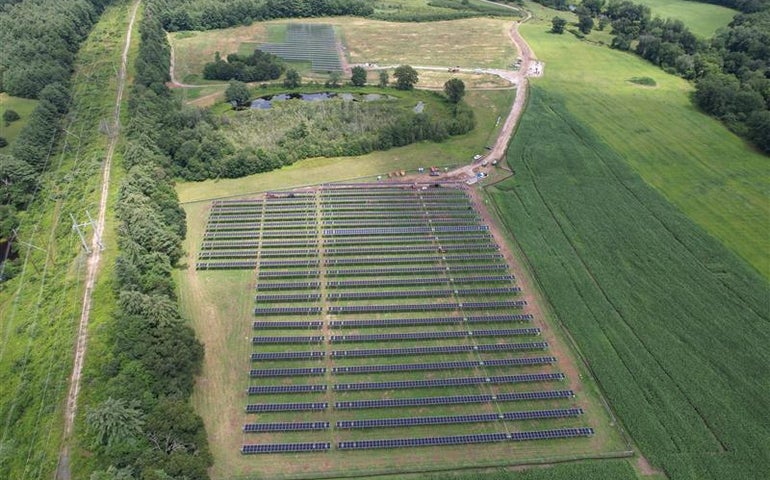A recommendation from a task force the Legislature created a decade ago resurfaced last week before the Revenue Committee, which took testimony related to the machinations involved when a farm wants to use a portion of its land to generate both renewable electricity and supplemental income.
The decade-old idea was brought to the committee by someone whose last stint in state government predates it, as Rep. Mark Sylvia testified for the first time as a representative and not in his Patrick administration-era roles as energy undersecretary or commissioner of the Department of Energy Resources.
He said his bill, H 3256, would allow the farmland owners to separate some land from the provisions of Chapter 61A, the state laws dealing with valuation of farm property and assessment of local property taxes, to be used for renewable energy generation and particularly solar arrays. The idea was among the recommendations issued in a 2016 report from the state’s Cranberry Revitalization Task Force.
“The positive impacts include helping the farmer generate income to support their agricultural activities while generating clean, local electricity in support of the commonwealth’s clean energy and climate goals,” the Fairhaven Democrat, who worked in top roles at solar and battery storage developer BlueWave after the Patrick administration, said at last Tuesday’s hearing. “The other positive impact is generating tax revenue for the town. Separated land will be subject to real estate taxes and personal property taxes on the solar array.”
Brian Wick, the executive director of the Cape Cod Cranberry Growers Association, told the committee that the bill is meant as a way to give cranberry growers — who produced the state’s top crop until cannabis became legal — the ability to put up “a relatively small-sized array.” He said it would apply to land that is subject to Chapter 61A but is not being used for production, so farmers could generate energy on it without facing the penalties and barriers normally associated with changes of use.
“We always want this to be a farming-first mentality. That’s the approach that we’ve taken with this, in that the primary purpose of that land needs to be farming and that needs to continue. So if there was to be a solar component to it, it would really need to be adjacent and secondary to its primary purpose of being a farm,” Wick said, adding that it would be important for lawmakers to settle on particulars like the size of allowed solar installations. “You can’t have the scale tipped so much that now the major income stream is becoming the alternative energy and not the farm.”
The idea of separating land from Chapter 61A didn’t sit well with Rep. Francisco Paulino of Methuen, who said he knows the benefits of renewable energy to farms from an apple orchard in his district that saves thousands of dollars on energy costs each year with a solar array.
“I’m all about farmers, but they’re going to be entering another industry that has nothing to do with farming. They’re going to be entering the energy industry,” Paulino said. He added later, “As a state, we give grants to farmers just to make sure they keep farmland as farm, not to use it for other business purposes … If we’re going to go to another industry, you know, like, that’s totally different.”
Sylvia said the bill he offered last Tuesday is identical to one that the Revenue Committee advanced favorably last session. The committee has two new chairmen this session, Sen. Jamie Eldridge of Marlborough and Rep. Adrian Madaro of East Boston. Neither explicitly tipped their hand on the bill last week and there was no testimony offered in opposition.
“I would just note in the district I represent, which has a large many apple orchards, is that one of the farms, Carlson Orchards, several years ago built solar on, I’d say, less than an acre and it now covers 90% of the energy needs of the farm,” Eldridge said. “So it’s basically saved the family farm from perhaps, you know, being developed or turned into housing or something.”
Sen. Becca Rausch of Needham questioned why clean energy is singled out when farms have other needs as well.
“Why solar as distinct from anything else? Why should we offer this particular benefit for the creation of solar as distinct from, say, water purification, right? These are all needs … They also need clean water, and they need housing for people who come and work,” she said. “And so why should we provide this for solar only, as opposed to any of the other needs of our agricultural businesses?”
Sylvia made clear that the bill speaks to “renewable energy” and not solar specifically and Wicks explained that the idea grew out of discussions that were specific to cranberry farmers at the task force’s meetings.
“The solar opportunities were quite large because of the way that the cranberry bogs are relatively open, the adjacent land is already cleared of trees. There’s a lot of positive aspects where you could put in a solar array, not have to take trees down and clear a forest to do some of those things,” he said. “So it was set up nicely. So it was really more of an opportunity than necessarily looking to shut out other opportunities.”

